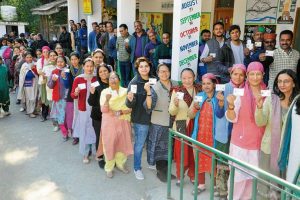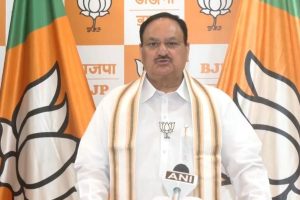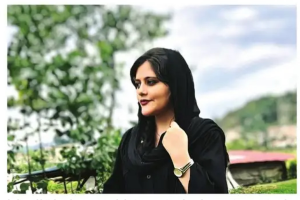India on Wednesday questioned the functioning of Pakistan’s notorious military courts and urged the International Court of Justice (ICJ) to annul Kulbhushan Jadhav’s death sentence, which is based on an “extracted confession”.
Jadhav, 48, a retired Indian Navy officer, was sentenced to death by a Pakistani military court on charges of “espionage and terrorism” after a closed trial in April 2017. His sentencing evoked a sharp reaction in India.
“Annul the decision of the military court and restrain Pakistan from giving effect to the (death) sentence. Release Jadhav and ensure his safe passage to India. If not then direct a trial under normal law before civilian courts with full consular access,” Deepak Mittal, Joint Secretary, the Ministry of External Affairs, told the ICJ judges.
Making the final submission in the ICJ on the third day of the hearing, Mittal requested the top UN court to declare that Pakistan acted in breach of Article 36 of Vienna Convention, failed to inform Jadhav of his rights and declined consular access to him.
“India requests this court to adjudge and declare that Pakistan acted in egregious breach of Article 36 of Vienna Convention,” he said.
Harish Salve, who was representing India in the case, also said that the time has come for the ICJ to make Article 36 a potent weapon for protecting human rights.
Salve said Pakistan has continued to misuse the opportunity provided by the ICJ in the Jadhav case.
“Apart from showing propaganda, Jadhav has become a pawn in Pakistan’s tool to divert international scrutiny from itself,” Salve said in his arguments during which he mentioned the “dastardly” terror attack in Pulwama and another in Iran last week by Pakistan-based terror groups.
He also said that Pakistan is under pressure from the Financial Action Task Force over terror financing.
Salve said that Pakistan is used as a safe haven by UN proscribed terrorist entities like al-Qaeda, LeT, JeM, Haqqani Network and individuals like Hafiz Saeed and underworld don Dawood Ibrahim.
He also cited Pakistan’s former prime minister Nawaz Sharif’s interview to a newspaper in which he acknowledged his country’s role in the 2008 Mumbai attack in which 166 people were killed by 10 LeT terrorists.
“This interview has not been denied,” Salve said.
On Pakistan’s military courts, he said the International Commission of Jurists and European Parliament have criticised their functioning and added that anything diluting provisions of Vienna Convention must fail.
“India’s criticism of military courts, the manner in which they function has been documented even by the European Parliament. If the military courts don’t measure up to due process then domestic statutory law is irrelevant…
“India submits that this court should not sanctify trial by military courts of civilians, especially trial by Pakistan military courts. Fair and public hearing? Absent. Competent and independent tribunal? Absent. Counsel of own choice? Absent. The court will have to decide for itself whether it considers that such a system can be sanctified,” Salve said, as he tore apart Pakistan’s notorious military courts.
“Jadhav’s trial was completed in 4-6 months or weeks…What happened to more than 150 people killed in the Mumbai terror attacks?” Salve asked as he raked up the Ajmal Kasab case to highlight the meaning of judicial review.
“In Kasab case, the LeT terrorist who was apprehended and caught red-handed by brave police officers, the Supreme Court of India examined materials on record first-hand since it was the case of the death sentence. This is called review,” he said.
On Pakistan’s argument that India did not provide proof of Jadhav’s nationality, Salve said Pakistan had no doubt when it arrested Jadhav that he was an Indian national.
“Pakistan is aware that to be an officer of RAW, the primary requirement is to be a citizen of India,” he said.
He said Pakistan’s claims that Jadhav was an Indian terrorist, sent by India, this is a flying leap of faith.
“Possessing a passport doesn’t make you party to those offences, your role in those offences gets you conviction. Jadhav is being sent to the gallows on the basis of an extracted confession,” Salve said.
“Pakistan has been reluctant to share with the world and the ICJ the judgement in which Jadhav was convicted. That judgement would show basis for conviction…There could no threat to the existence of Pakistan if these documents are made available to India,” he said, adding that he has little doubts that there was any substantive evidence of Jadhav’s involvement.
Salve said three attempts made by Pakistan to derail proceedings in the ICJ have failed. He also objected to the abusive language used by Pakistan’s counsel in the case.
“There was a time when the world respected Pakistan, today the world doesn’t have the same respect for Pakistan in its own incarnation,” Salve said, taking a dig at Pakistan’s counsel Khawar Qureshi, who on Tuesday said ‘he has great respect for India but not its present incarnation.’
India moved the ICJ in May 2017 for the “egregious violation” of the provisions of the Vienna Convention by Pakistan by repeatedly denying New Delhi consular access to Jadhav.
The four-day hearing in the Jadhav case opened Monday amidst heightened tensions between India and Pakistan following one of the worst terror attacks in Jammu and Kashmir by Pakistan-based Jaish-e-Mohammad terror group that killed at least 44 CRPF soldiers.
The ICJ is expected to deliver its verdict in the summer of 2019.











